(Note: Before reading on, just know, the humans are indeed okay! It’s just a play off of yesterday’s blog title: The Chimps Aren’t Alright)
Before we get into the blog, let’s play a game! Can you guess who was hoarding PVC Tubes from the night before in their nest? The answer will be at the end of the blog!
Today is World Mental Health Day! World Mental Health Day was first celebrated in 1992 as a way to raise awareness, education, and to try to help break the stigma which surrounds mental health. With it being today, I thought I would talk about something that is gaining more traction in the world of chimpanzee caregiving: Compassion Fatigue.
Compassion fatigue affects those who work in a occupation relating to caregiving; i.e. doctors, nurses, EMT, psychologists, physical therapists, veterinarians, and yes, caregivers of both human and non-human animals. In 2010, Dr. Patricia Potter described compassion fatigue as the “traumatization of helpers through their efforts at helping others” in her study of compassion fatigue in oncology nurses. Compassion fatigue consists of two things: burn out and secondary traumatic stress. Caregivers who are burnt out may experience unhappiness, disconnectedness, insensitivity to their work environment, exhaustion, and feelings of being overwhelmed, bogged down, and being out of touch of who they want to be. Secondary traumatic stress is when caregivers simply cannot get those whom they help out of their thoughts. It can cause sleeplessness, forgetfulness, and the inability to separate private and professional life.
Dr. Potter’s study was then replicated by Dr. Mary Lee Jensvold of the Fauna Foundation and Central Washington University to specifically look at compassion fatigue in chimpanzee caregivers. To the surprise of almost no one, chimpanzee caregivers experience compassion fatigue. I will plead the 5th on saying if any of my fellow caregivers here (both staff and volunteers) have or have not experienced compassion fatigue at any point, but I will talk about my own experiences with it in an attempt to try to break the stigma around openly talking about mental health.
I have showcased some of the symptoms of compassion fatigue. For me, it’s very hard to separate my personal life from my caregiving one. The chimpanzees are always on my mind, even on my weekends, holidays, and vacation. I sometimes stay awake at night, particularly if the chimpanzees have been worked up and there’s a lot of fights or other emergencies. I also have this constant, nagging feeling what I am doing is not good enough for them. Not to say what I do is terrible, just that feeling like it’s not enough for them. Even just trying to hang out with the chimpanzees can take its toll when you have not just one or two trying to vie for your attention, but several. It’s just one of those moments when you wish you could clone yourself several times over, but can’t, so you’re going to leave somebody disappointed. A terrible feeling for a caregiver.
Though I know I personally will not be able to address every single one of these things that contribute to my own fatigue, I can address most of them.
Recent articles detailing compassion fatigue do have many tips in trying to combat it. This next part is mostly for other caregivers around the world, but for all the well wishers still reading, maybe you can use it as well. My first humble suggestion is to read more about compassion fatigue, what it is and what are the symptoms of it. The two articles linked in this posting are great starts. Second suggestion is to look after yourself. It is 100% okay to take those days off you’ve been wanting to take. Go see family and friends. Go for a hike. Go travel to places you have never been to but always wanted to go. Do whatever it is that makes you happy and brings peace into your life. Don’t think about work. Your time off is just that: YOUR time off. It’s incredibly difficult to not think about work when you aren’t there, I know. But you have to in order to continue on in this field. Turn off you work notifications. Hide anything that is work related in your home. And most of all, trust your fellow caregivers. They are well trained, know their job, are just as capable as you, and can handle anything while you’re away. (I don’t mean to imply I don’t trust the other caregivers here. I do 100%. But I know that is a feeling associated with compassion fatigue.)
This job is a truly unique life experience. It is not a mundane, putting checks in boxes type of career. You constantly have to be on your toes, think outside the box, and be prepared for things you probably haven’t thought of. This job requires a lot of stamina, passion, and hard work and decision making. In order to do that, you have to take care of yourself and recharge. I once asked an activist I know how she is able to continue to carry so much passion for what she believes in and continue to fight for it. She told me, “you cannot pour from an empty cup. Make sure you’re taking care of yourself mentally and physically so that cup can always have something to pour.” So those are the words I will leave you with.
Now onto another plugin. Jamieween is quickly approaching. Be sure to continue to check out our Amazon Wish List for items for one of the biggest celebrations we celebrate! In fact, today and tomorrow is Amazon Prime Day! So some things may be at a reduced cost!
And it wouldn’t be a blog without some photos, right!?
Negra fishing peanut butter out from between Frisbees
Honey B perusing through some magazines while eating her lunchtime chow biscuits
Burrito and his stick collection he amassed from the expanded Young’s Hill laid out for him by caregivers
And the nicest guy around: Teeny Tiny Terry!
And the answer to who was hoarding the PVC tubes in their nest….
It was Negra!!!
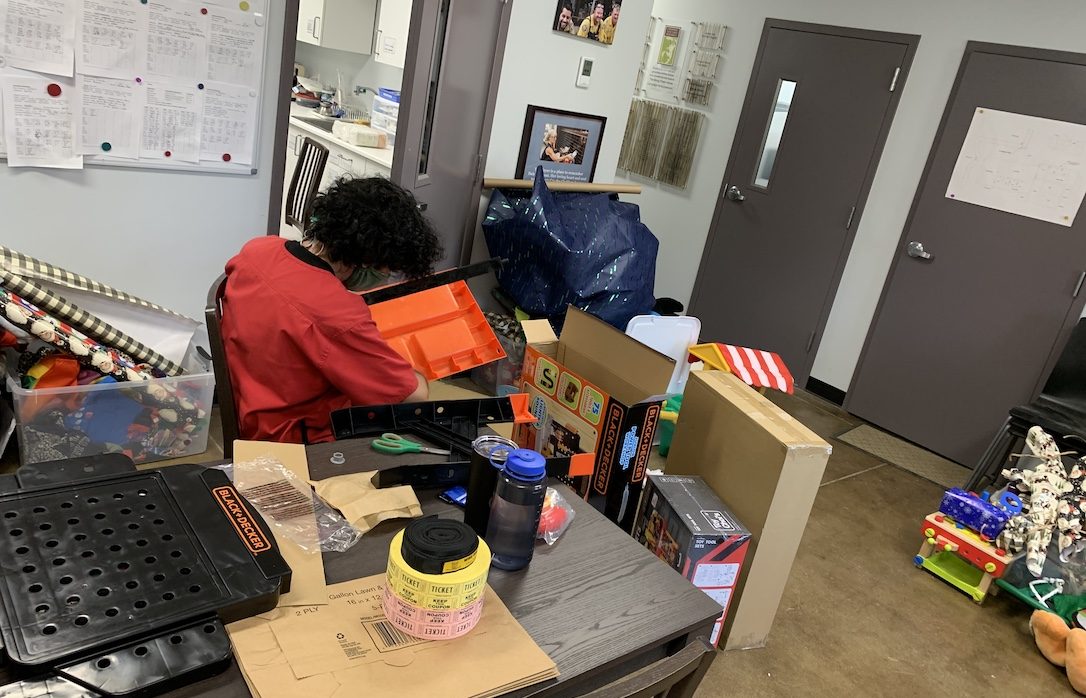
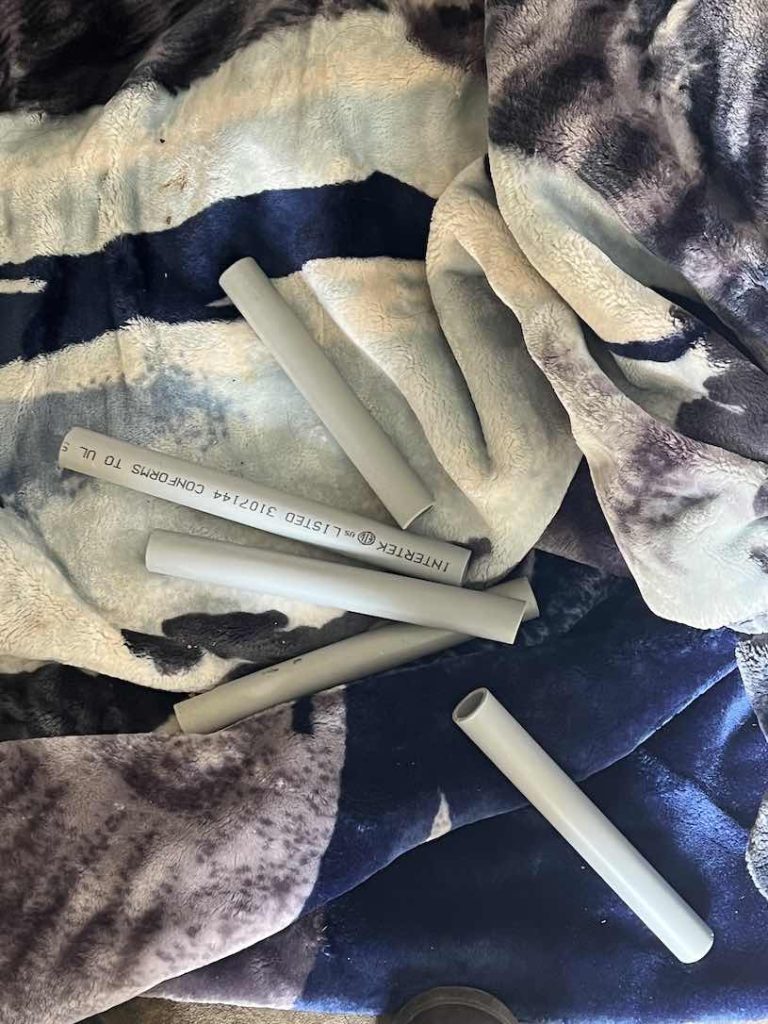
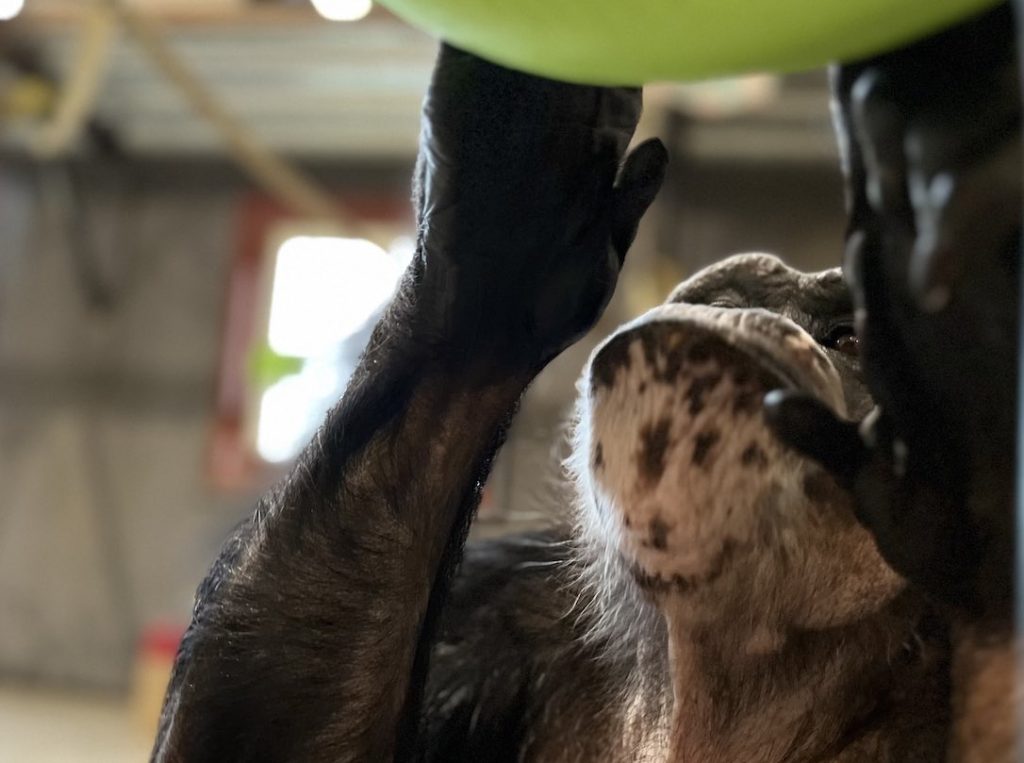
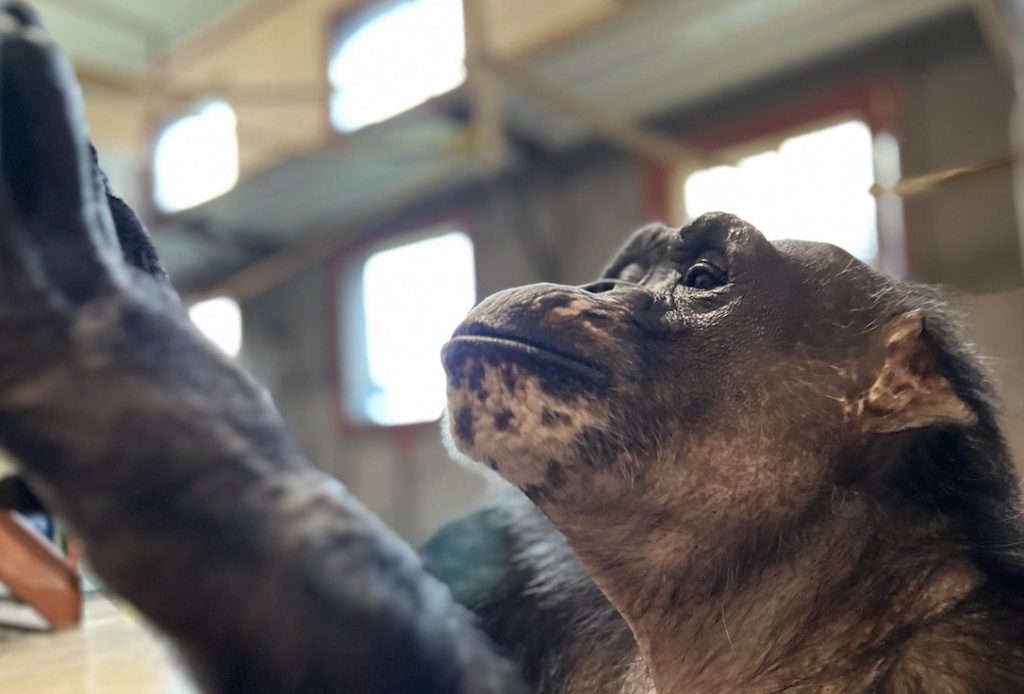
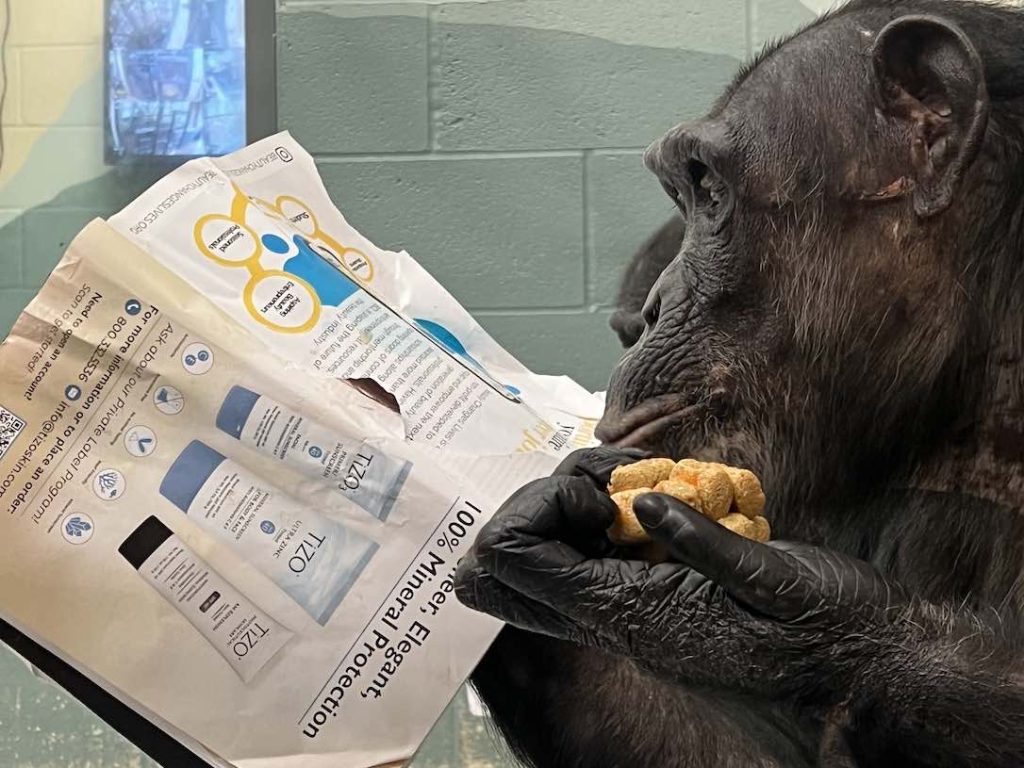
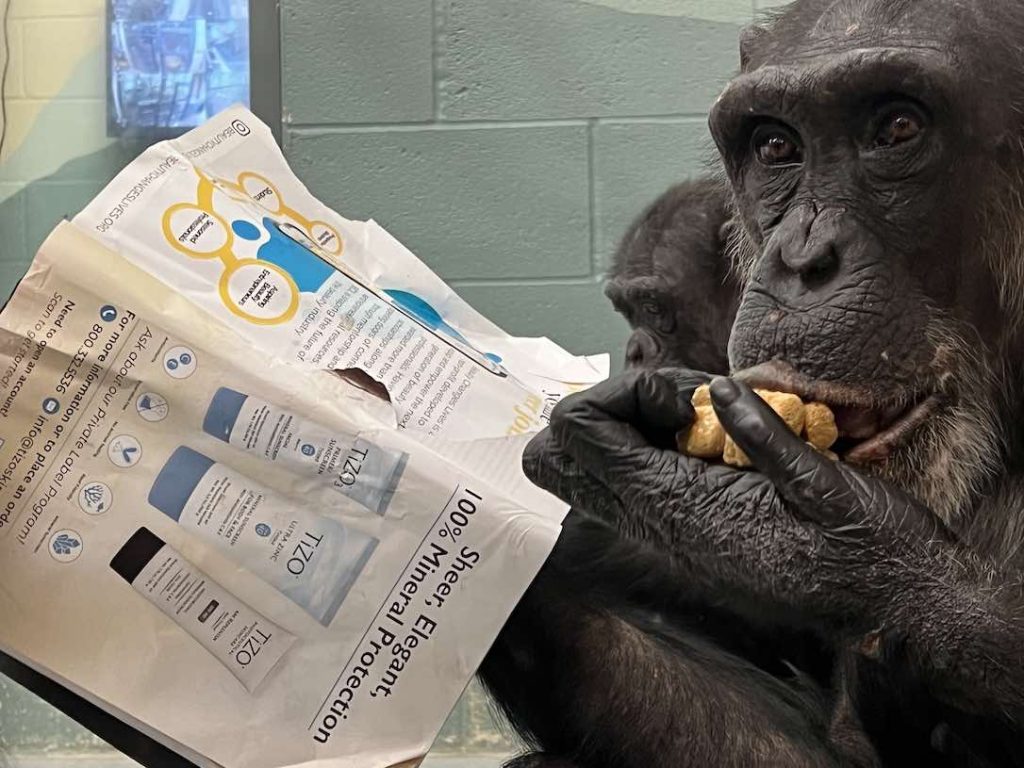
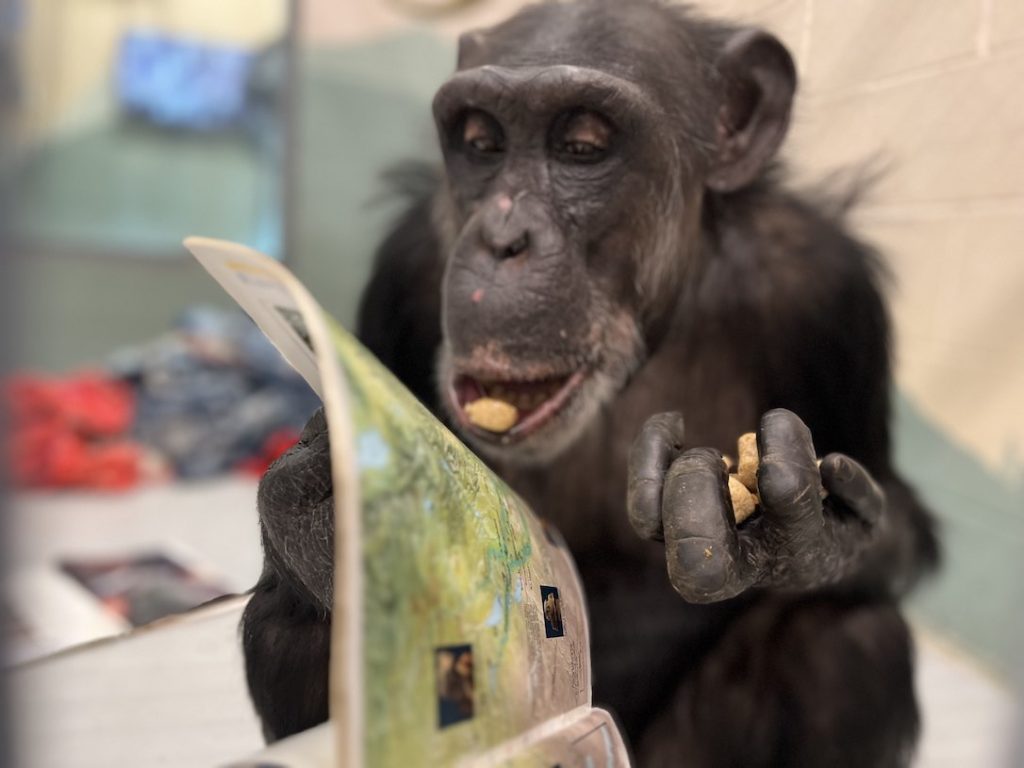
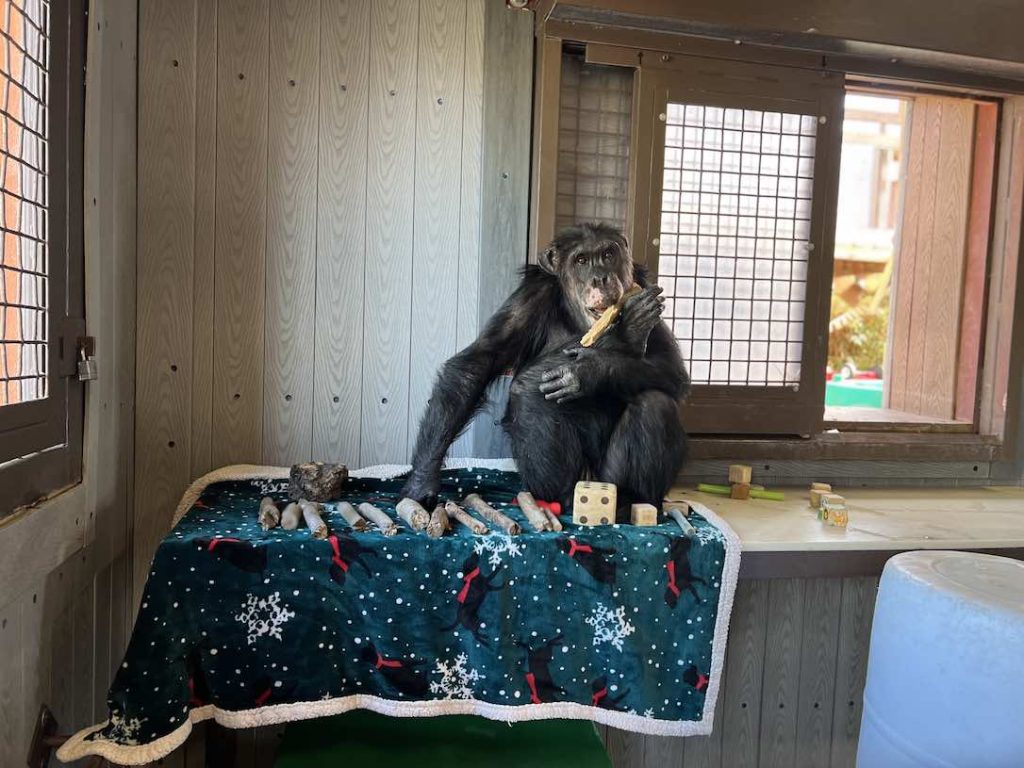
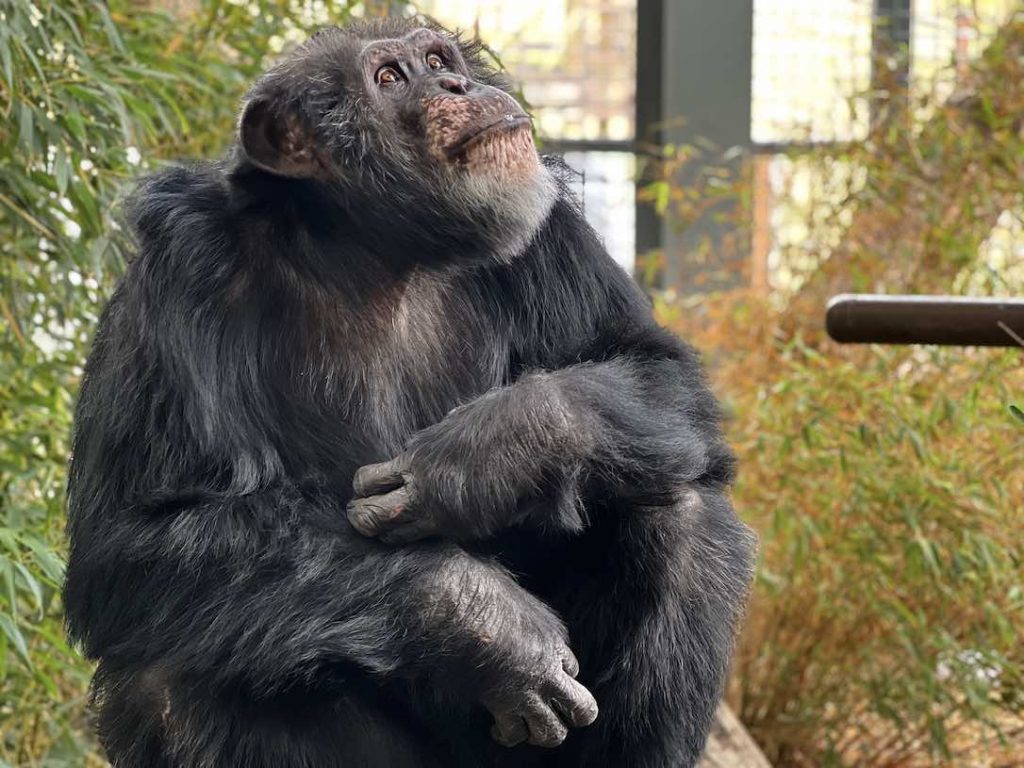
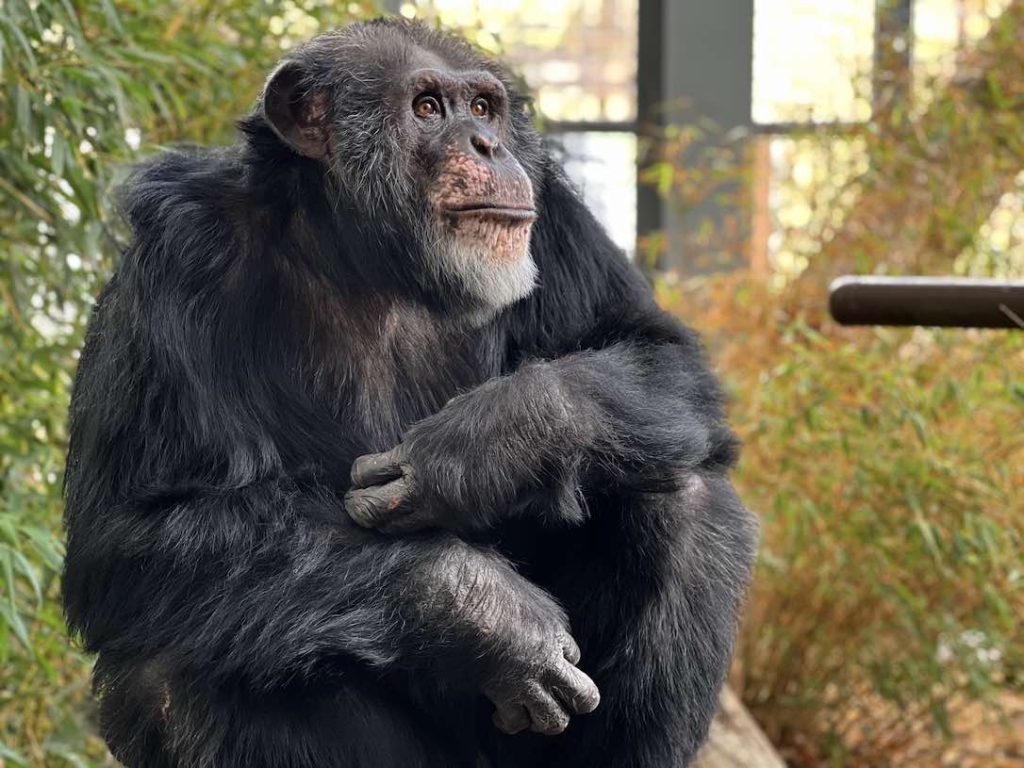
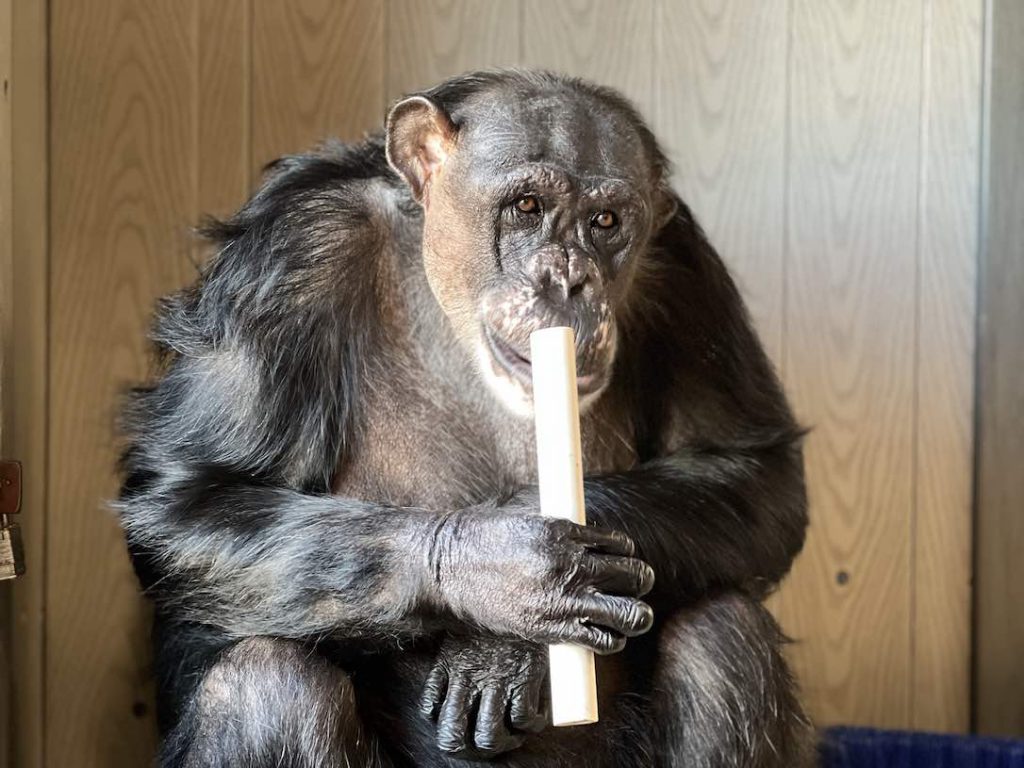





Chad, I appreciate your candor in your post. While I am sure that there is a sense of accomplishment and joy in your work, there is also sorrow. When our Jody left this world, there were still four cattle and fifteen other chimpeople who needed attention. Those of us who follow this blog see and a lot of endearing activities of and about the residents (is Negra going into the plumbing supply business?), but I know that there are some rough times that you and the other caregivers experience.
Take care of yourself. It looks like your friend Bub might want to throw a stick and have you chase me it…
Special thanks to all those who do so much for the residents of CSNW-you are appreciated so much. I am a teacher, which resembles alot of what you spoke about. But at the end of the day, loving what you do and those you do it for made me want to do better for myself, to be there for my “charges”! Take care!
We have to ask, was there peanut butter smeared on the PVC tubes or were they in any way PB adjacent?
Bless All of you….for your Hard Work and Compassion ……..You are a part of their Chimp Family….You bring them Peace and Comfort ……Every day******…… Always Care and Protect them…..and Care for Yourselves………So you stay the best you can be……Everyone needs Rest and Relaxation ….CELEBRATE Those days off…You deserve it:grin::maple_leaf::rainbow:
😀
2 very thought provoking blogs, one by J.B. yesterday and Chad’s today. I tried to think of who had PVC tubes in their nest but did not think of Neggie.
Two very thoughtful blogs from you boys…..I can easily see how such an intense job could lead to problems. After all, as you say Chad, it’s not just checking boxes…..chimpy and bovine lives depend on your commitment as well as your human colleagues. I sometimes have to force myself to stop thinking of the terrible past that they, and many other animals endured, and focus on what we can do to give them happiness and hope now and in the future. Thank you both for such thought provoking blogs.
PS……Neggie was the last one I would have guessed! Sorry Honey B, I put the blame on you.
I also put the blame on Honey B. I thought it was either her or the other notorious enrichment hoarder, Jamie.
I never figured it would be Neggie!
For me: the blancket gave it away that is was Neggie.
You really are dear and lucky people! Thank you for your precious daily work and also for sharing your experience, knowledge and even feelings with us readers!
I know you guys work super hard day in and day out, not just physically, but emotionally. Taking care of any living thing is hard enough, but particularly ones that are so intelligent, complex, whose ways of thinking are, at times, utterly mysterious to us (as I’m sure ours are to them). In the case of chimpanzees in sanctuary, there are also emotional and physical scars to contend with.
Recently, I read the paper Building an inner sanctuary: complex PTSD in chimpanzees and it was extremely difficult to get through. The behaviors that Rachel and Jennine both exhibited when they arrived at sanctuary were shocking and I can’t imagine how difficult it had to be for their caregivers to witness first hand. There’s a level of trauma that comes from that for the caregivers, I think. It’s easy to get overwhelmed. It’s important to be able to realize when you are getting overwhelmed and be able to give yourself some space, although it’s definitely easier said than done.
Dear Chad,
You have a wise friend…Like many mothers for example….you cannot look after other human or chimp people if you do not look after yourself first.
I would like to suggest you caregivers have a meditation session (does not have to be long) after work together to clean yourselfs energeticly and leave work in the workplace.
I can definitely attest to the toll it can take. I was a caregiver to my mother through years of Alzheimers and finally hospice. She died in January and some of that mental fatigue still lingers. Now that my father has been diagnosed with leukemia I’m seeing how incredibly devoted and caring his oncologists and nurses are. They are at the top of their game every visit. I can only imagine the exhaustion they must feel. I can only reinforce that you need to take time for yourself and don’t feel guilty when you need to take a step back. In every type of caregiving never let yourself forget that you are doing it because you care and you love.
,
Chad, I understand compassion fatigue. Your experience working with chimpanzees is totally different from mine, much more intense and draining for you. I volunteer with dog shelters/rescues and as graphic designer I have also worked with many animal organizations to design and market their missions. I love what I do. But, I carry certain worries like a weight in my heart, keeping me awake at night, always feeling like there is more to do.
For over a decade, I was the last person the leave the dogs at the end of the days I volunteered. Saying my goodbyes, turning off the lights, and closing the door behind me made me feel as if I could cry. I go home to my spoiled shelter alumni but these good, sweet dogs remain in their kennels. Waiting. And the shelter I volunteer with is one of the finest by far, and yet, the dogs are still in a shelter and not in homes. I only mention all this because I often think about what it must feel like for caregivers who end their sanctuary day, closing the door behind then. My dog friends will all, eventually, be adopted. But the chimpanzees in your care will always be in captivity. Yes! The chimps have a life full of friendship, freedoms, enjoyment, and loving care from people oozing compassion. But still, how could you not find your thoughts, driven by your heart and not your head, often wandering to what the chimps are experiencing when you not there with them?! This is why you make superior caregivers. You lead with your heart.
Your friend is very wise— “you cannot pour from an empty cup.” Hug your friend for me. I will remember this.
I hope you all discuss your experiences battling compassion fatigue. Individually and together, as caregivers for chimpanzees, you understand the emotional daily upheavals that occur within your hearts. Sometimes just speaking your thoughts out loud helps. Please know we appreciate your honesty on the serious nature of caring for these individuals. Your post and J.B.’s post from yesterday remind us that all the joyful moments are only a portion of your job responsibilities. Being a caregiver spills over into your personal lives. You not only go home to smile or laugh over a funny exchanges you have the chimps, you also reflect on the difficulties you experience, always wondering what you can offer to improve upon the existing situation.
New rule. Ask yourself what you can do to improve upon your existing situation. How can you enrich your life? How can Chad be the best caregiver for Chad?
Now. To your mystery question. NEGRA?! What?! I was all in with it being Honey B! Mainly because I could see her doing this, but also because I recall how much she loved the thick, dense, warm, cozy wolf blankets. This is just one of the many reasons I love Negra top to bottom in my heart. She will always surprise you.
Being responsible for others is very stressful. Whether being a business owner with employees who depend on you for their livelihood, and whose clients have their own responsibilities that depend on your products or services being correct and on time, or a caregiver whose “patients” are totally dependent upon you. Responsibility can be a great burden. Add on top of that, emotion. I often think of you caregivers and how you come in day after day after day to a very physical job with extreme responsibilities. It is critical that each of you find the way that best gives you both physical and emotional relief. It will be different for every person. But you must take care yourself first, or you won’t be able to do what you need to do for others. That’s not always intuitive. Like giving yourself the oxygen first in an airplane emergency. and there are so many other responsibilities, your spouse, your children, your elderly parents perhaps. Just remember that you are also responsible for your own care and you must find your own way to cope. It’s okay, in fact necessary, to put yourself first. I’m so glad you’re reading articles like the ones you mentioned. Keep looking for new ways to cope healthfully.
All of you are all always in my heart.
Negra sure is surprising us a lot lately!
Thank you so much for sharing this thought provoking blog, Chad. The welfare of the chimps and bovines at your beloved sanctuary is literally in your hands and and it must be such a fine balancing act to coordinate this daily work. All life is precious and that includes yours and your fellow workers st the sanctuary so please take good care of yourselves and always keep that cup topped up. We are so grateful to have you all in our lives. Bless you all.
I’m just reading this now and it is spot on. Thank you Chad for sharing your thoughts and feelings, the facts and studies about compassion fatigue, and ways to combat it. I was surprised that you feel the same way I did each day while caring for the chimps at LEMSIP, especially the youngsters (9 of whom you love and care for now) – like I never did enough. And I always felt so guilty about not being able to give everyone attention each time several were rightfully vying for it. That was so hard. Reflecting on the good moments is great advice, along with the most important thing – taking care of yourself so that you have something to pour. Thirty years later and I am still affected. Thank you for this and thank you for loving the chimps!
I wanted to clarify that though I was surprised that you feel that you just can’t do enough for the chimps each day, I can certainly understand and validate your feeling. And I certainly relate to them. I was just surprised since I am soooo thankful for all the love, care, and special things you guys give to the chimps each day there. It’s a world away from the awful conditions of the lab they were in. We didn’t have enough staff, resources or time or space, etc. to meet their needs. But I can see how, as a compassionate caregiver knowing where they came from, you would feel the same way. We want to give them any and everything, not only because of what they went through but because they are each awesome, unique, individuals who have become family. Thank you again.